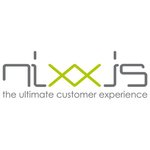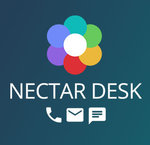Most call center software may be accessed from numerous devices and platforms. Agents can use the program on computers, laptops, tablets, and even smartphones, independent of operating system. This not only provides flexibility in device usage, but also ensures consistent access to the program independent of location or device preference.
List of 20 Best Call Center Software
InVision Enterprise WFMis a workforce management solution designed to streamline your business operations. With seamless integration and real-time adaptability, InVision Enterprise WFM empowers your team to boost productivity and cultivate a culture...Read More InVision Enterprise WFM
Newbridge is the contact center software that is revolutionizing the customer experience. Featuring cutting-edge AI technology, our platform offers a state-of-the-art IVR system and omnichannel support for effortless interactions and exceptional serv...Read More Newbridge
DialerHQ solution for streamlined communication. With DialerHQ, you can make calls and send messages using a separate number while keeping your personal one private. Enjoy the highest level of privacy and security, as all conversations are completely...Read More DialerHQ
Dialer360 is a Cloud-based call center solution that elevates your calling capabilities. Our suite of features, including Predictive dialer and SMS & Voice broadcasting, caters to all your communication needs with efficiency. With round-the-clock sup...Read More Dialer360
CallCenterNOW - an advanced call center software that enhances customer experience and streamlines operations for modern businesses. With customized features, real-time data analysis, and seamless integration, this platform maximizes agent productivi...Read More CallCenterNOW
Promero is the leading provider of cutting-edge call center solutions, offering seamless integration, unmatched customer support, and advanced AI capabilities. Optimize your customer satisfaction and operational efficiency with our software, availabl...Read More Promero
Nixxis Contact Suite is the leading telephony solution that elevates productivity and enhances customer satisfaction. Experience a seamless integration with your existing systems for streamlined call handling, ticket management, and targeted campaign...Read More Nixxis Contact Suite
SandeshLive is a software that is revolutionizing the industry through its advanced technology. With state-of-the-art features, it offers unmatched efficiency and an exceptional user experience. By modernizing outdated processes, this innovative plat...Read More SandeshLive
Jacada is a leading provider of cutting-edge automation software for businesses looking to transform their customer service experience. Our technology simplifies complex processes, resulting in exceptional support, lower costs, and increased efficien...Read More Jacada
Nectar Desk, call center software designed to enhance customer interactions, maximize agent productivity, and offer in-depth insights with its user-friendly reporting. Seamlessly integrating with multiple channels and equipped with real-time analytic...Read More Nectar Desk
Discover the efficiency and convenience of Dialpad, the top cloud-based telephony solution designed for seamless team communication. Say goodbye to disruptions with crystal clear voice and video calls, all accessible from anywhere and anytime. With D...Read More Dialpad
Arcane Lite - the advanced and compact USB recorder that simplifies recording and managing phone conversations. Compatible with analog phone lines, it effortlessly captures incoming and outgoing calls, allowing you to retrieve and analyze vital infor...Read More Arcane Lite
Genesis Dialer is a call management solution for businesses. Boost productivity and improve customer engagement with automated dialing, real-time monitoring, and customizable reporting features. Seamlessly integrated with CRM systems, this tool is es...Read More Genesis Dialer
ContactInSky, a contact center software built using Microsoft technologies. It is designed to optimize agent performance and streamline operations. With its robust capabilities, agents can effectively handle customer interactions, resulting in height...Read More Innovative ContactInSky
SPLICE Dialog Suite is a tool for customizable customer communication. Stay connected with your clients through various channels like text, chat, email, and voice, enabling timely and personalized interactions. Simplify your operations, save on costs...Read More SPLICE Dialog Suite
CallMiner Eureka is a conversation intelligence platform that harnesses the power of AI and machine learning to transform customer interactions into actionable insights. With its advanced capabilities, it empowers organizations to enhance customer ex...Read More CallMiner Eureka
IpSCAPE is a cloud contact center solution equipped with cutting-edge AI capabilities. Elevate customer experiences and streamline communication with powerful omnichannel tools and seamless integrations. With its advanced features and user-friendly d...Read More IpSCAPE
Anywhere365 is a Dialogue Management Solution that seamlessly integrates with Microsoft Teams, enhancing customer support through omnichannel capabilities. Powered by AI and automation, it enables businesses to optimize communication, increase effici...Read More Anywhere365
Brekeke CCS is a premier contact center solution designed to streamline operations and enhance customer interactions. Leveraging SIP server integration, multitenant support, and advanced omnichannel capabilities, it empowers your contact center to ef...Read More Brekeke CCS
NeoDove mobile application focused on simplifying sales workflows. Handle leads and contact prospects seamlessly with NeoDoves remote accessibility. Stay updated on conversions and lead activity through real-time monitoring and detailed analytics. En...Read More NeoDove
Learn More About Call Center Software
- What Is Call Center Software?
- What Are The Recent Trends In Call Center Software?
- Benefits Of Using Call Center Software
- Important Factors To Consider While Purchasing Call Center Software?
- What Are The Key Features To Look For In Call Center Software?
- Why Do Businesses Need Call Center Software?
- How Much Time Is Required To Implement Call Center Software?
- What Is The Level Of Customization Available In Call Center Software?
- Which Industries Can Benefit The Most From Call Center Software?
- Conclusion
What Is Call Center Software?
Call center software is a technology solution that helps firms manage and streamline their customer service and support operations. It is a comprehensive system that comprises a variety of tools and features aimed at increasing call center agent productivity, improving customer satisfaction, and driving overall business growth. This software is essential for any firm that wishes to provide excellent customer service while maintaining a strong brand reputation.
One of the most important characteristics of call center software is its ability to manage numerous communication channels, such as phone calls, emails, live chat, and social media interactions, all from a single unified interface. This enables call center personnel to easily process and respond to customer queries, requests, and complaints over many channels, leading in faster response times and a more seamless customer experience.
Furthermore, call center software provides comprehensive call-routing features, ensuring that clients are quickly and efficiently linked to the most suited agent depending on their requirements and talents. This not only reduces wait times, but also improves the quality of interactions, resulting in higher customer satisfaction. Call center software also includes important capabilities such as call recording and monitoring, which enable managers to monitor agent performance and provide coaching and feedback to promote continual improvement.
It also provides powerful reporting and analytics capabilities, enabling businesses to track and measure critical metrics such as call volume, wait times, and customer satisfaction rates in order to make data-driven choices and enhance overall call center operations. Furthermore, some call center software includes advanced capabilities such as virtual queueing, speech recognition, and artificial intelligence (AI) chatbots, which can improve the customer experience while reducing human workloads.
What Are The Recent Trends In Call Center Software?
In recent years, the call center software business has seen considerable developments and innovations, resulting in a shift in market patterns. These trends have been primarily driven by the growing demand for more efficient, scalable, and customer-centric call center systems. In this section, we'll go over the most important trends that purchasers should be aware of while selecting call center software solutions.
1. Cloud-Based Solutions: Cloud-based call center software has emerged as one of the most significant trends in recent years. This technology enables enterprises to access call center capabilities via the internet, hence removing the need for traditional on-premise systems. Cloud-based solutions provide better flexibility, scalability, and cost savings for enterprises, making them a popular choice among purchasers.
2. Omnichannel Communication: In today's fast-paced world, customers want to communicate with businesses across several channels such as phone, email, chat, social media, and more. As a result, call center software suppliers have begun to offer omnichannel solutions, which enable organizations to engage with clients smoothly across numerous platforms. This trend is critical for firms that want to create a seamless and consistent consumer experience.
3. Artificial Intelligence (AI): The integration of AI and machine learning technology is a major trend in the call center software business. These improvements allow contact centers to automate a variety of operations and duties, including call routing, customer data analysis, and even chatbots for customer engagements. AI-powered call center solutions can help businesses save time and costs while also improving the customer experience.
4. Customizable Features: As the need for call center solutions rises, so will the need for increased flexibility and customization. Modern call center software suppliers include a variety of features and capabilities that may be customized to match the unique demands of a business. Buyers should search for software with a wide range of customizable capabilities, such as call scripts, IVR menus, and performance analytics.
5. Improved Security: With growing worries about data privacy and cyber risks, call center software manufacturers are prioritizing security features in their products. This includes comprehensive data encryption, tight access controls, and adherence to industry-specific requirements. Buyers should ensure that the software they purchase has enough security safeguards in place to protect their customers' data.
Benefits Of Using Call Center Software
Call center software is a useful tool for businesses of all kinds that deal with a high volume of consumer calls. This comprehensive program automates many areas of call center operations, allowing businesses to provide more efficient and effective customer care. Let's look at the primary advantages of employing call center software to assist you make an informed decision about your organization.
1. Increased Efficiency: One of the most significant benefits of employing call center software is enhanced efficiency. Automatic call distribution, call routing, and interactive voice response (IVR) enable calls to be routed to the proper agent or department in a timely and efficient manner. This removes the need for manual phone transfers and shortens wait times, resulting in a more seamless client experience.
2. Improved Customer Service: Call center software enables organizations to provide superior customer service, which is critical for attracting and retaining loyal customers. Call monitoring, call recording, and real-time analytics help agents better understand their customers' needs and provide tailored and timely support. This creates a favorable consumer experience and raises customer satisfaction levels.
3. Cost Savings: Implementing call center software can result in significant cost reductions for enterprises. Call center software, which includes capabilities such as call queuing, routing, and IVR, helps to cut staffing costs by optimizing agent workload and handling calls. Furthermore, by providing a more efficient and simplified customer experience, organizations can reduce customer turnover while saving money on new customer acquisition.
4. Scalability: Call center software is extremely scalable, meaning it can adapt to a company's growth and changing demands. Whether you have a small staff or a large call center, our software can adapt to your needs and handle a greater amount of calls as your business grows. This makes it an excellent alternative for firms seeking a long-term solution to their customer service requirements.
5. Increased Productivity: Call center software, which includes features such as call queues, callback options, and automatic call distribution, helps operators improve their efficiency. These solutions ensure that operators are not overwhelmed by a high volume of calls and can handle them effectively. This results in a better structured work environment, higher agent morale, and, ultimately, increased production.
6. Real-Time Analytics: Call center software has powerful reporting and analytics features that enable real-time visibility into your call center's performance. Businesses with access to data on call volumes, wait times, and customer satisfaction levels can make informed decisions to continuously improve operations. These findings can also assist identify areas for development and improve overall customer service.
Important Factors To Consider While Purchasing Call Center Software?
With so many options on the market, it might be difficult to select the best call center software for your organization. When selecting call center software, you must examine several factors to make an informed purchase. Let's look at these key factors:
1. Scalability: Scalability is an important consideration when selecting call center software. Your call center requirements will develop in tandem with your business. As a result, it is critical to select software that can readily scale with your organization and adapt to changing needs and requirements.
2. Features And usefulness: Before making a purchase, carefully consider the software's features and usefulness. Determine your company's requirements and choose software that includes all of the necessary functions, such as IVR, call routing, recording, and reporting. It is also critical to evaluate the ease of use and customization possibilities.
3. Integration: Good call center software should work easily with your existing systems, such as CRM, support desk, and communication tools. This will provide your agents access to all of the information they need, resulting in enhanced customer service and efficiency.
4. Cost: The cost of call center software varies substantially based on the features and capabilities available. It is critical to keep a budget in mind and select software that provides the best value for your money. Consider not only the initial cost, but also any ongoing expenses such as maintenance and upgrades.
5. Customer Support: In the fast-paced world of contact centers, any downtime can lead to severe losses. As a result, it is critical to select a software vendor that provides dependable and timely customer assistance. Look for alternatives like 24/7 assistance, live chat, and phone support to guarantee that your call center functions efficiently and without interruption.
6. Security: With the growing amount of cyber threats, it is critical to select call center software that includes strong security features. To protect your customers' sensitive information, your software should include capabilities like data encryption, secure call recording, and security against social engineering assaults.
What Are The Key Features To Look For In Call Center Software?
One of the most important considerations while looking for the best call center software is its essential features. These characteristics can significantly impact the efficiency, productivity, and success of your call center operations, making them critical for any buyer to consider. Here are the top characteristics to look for when selecting a call center software.
1. Omnichannel Capabilities: In today's fast-paced business world, clients expect to contact organizations via a variety of channels, including phone calls, emails, live chats, and social media. A call center software with omnichannel capabilities enables you to manage client questions and interactions across all channels, resulting in a better customer experience.
2. Advanced Call Routing: Call routing is the process of routing incoming calls to the most relevant agents or departments using established criteria. Look for call center software that supports advanced call routing features including skill-based routing, intelligent routing, and self-service choices. These features ensure that each call is handled by the most qualified agent with the relevant skills and knowledge, resulting in superior customer service.
3. Interactive Voice Response (IVR): An IVR system allows customers to select options using their telephone keypad before speaking with a representative. IVR can help direct clients to the appropriate department, collect information from them, and even accomplish simple activities without the need to communicate with an agent, lowering wait times and increasing efficiency.
4. Real-Time Monitoring And Reporting: A decent call center software should allow you to track the performance of individual agents, departments, and the entire call center. It enables managers to spot bottlenecks, make data-driven decisions, and continually enhance call center operations.
5. Call Recording And Analytics: The ability to record and analyze calls can provide useful information about customer behavior, agent performance, and overall call center effectiveness. This tool enables managers to find improvement opportunities, educate agents, and ensure regulatory compliance.
6. Integration With Other Business Tools: Look for call center software that works with your current CRM systems, help desk software, and productivity tools. This integration can improve workflows and give a more consistent experience for both customers and agents.
7. Customization And Scalability: Because each call center has distinct demands and requirements, choose software that allows for customization to meet your specific needs. Consider a scalable system that can expand with your company and respond to changing demands. By taking these main qualities into account, you may select call center software that suits your individual requirements and enables you to give excellent customer support. So, thoroughly assess these qualities and select software that corresponds with your company's aims and objectives.
Why Do Businesses Need Call Center Software?
Businesses require call center software to effectively manage customer interactions and streamline communication operations. These software solutions are critical for handling large volumes of incoming and outgoing calls, ensuring a smooth and seamless experience for both customers and agents. One of the primary reasons firms use call center software is to improve customer service.
Companies may use the correct software to build a consolidated center for all of their customer contacts, allowing agents to more easily access client information and deliver tailored and timely service. This leads to increased customer happiness, loyalty, and retention, which improves the business's bottom line. Furthermore, call center software includes a variety of features that can help businesses increase production and efficiency.
These include automatic call distribution, routing, IVR systems, call monitoring and recording, and real-time analytics. Businesses can use these capabilities to enhance their call handling procedures, minimize wait times, and boost first-call resolution rates, resulting in increased productivity and cost savings. Another reason why firms require call center software is to get more control and visibility over their call center operations.
Managers can track agent performance, call volumes, and customer satisfaction levels using powerful reporting and analytics tools. This aids in identifying system bottlenecks and making data-driven decisions to improve the overall efficiency of the call centre. Furthermore, call center software integrates seamlessly with other corporate tools and systems, such as CRM software and help desk solutions.
This integration allows agents to view all relevant customer information and interactions in one place, resulting in a more unified and consistent customer experience. In today's fast-paced business environment, client expectations are constantly changing, and organizations must keep up to remain competitive. Call center software offers a scalable and adaptable solution for changing business demands, such as scaling up or down, introducing new services, or connecting with other systems.
How Much Time Is Required To Implement Call Center Software?
The implementation time for call center software varies depending on the program and the organization's requirements. A call center software implementation typically takes 4-6 weeks, from initial consultation to final deployment. During the initial phase of deployment, the call center software vendor will collaborate with your team to evaluate your present business processes and requirements.
This allows them to tailor the software to your specific requirements and ensure a seamless transfer. Next, the program will be set up to work with your existing systems and databases. This could take several weeks, depending on the intricacy of your setup. Once configured, the call center software will be tested to ensure that it functions properly and meets your company's requirements.
This stage is critical for identifying and resolving any potential difficulties before the launch. Finally, the program will be released, and your team will be trained on its various functions and features. The length of the training time will be determined by the size of your team and their expertise with call center software. To achieve successful execution, a dedicated project manager and a well-designed project plan are required.
This will help to streamline the process and reduce any delays. In summary, the implementation time for call center software can range from 4-6 weeks, although this might vary based on your organization's requirements and the complexity of your setup. With careful planning and communication with your software vendor, you may expect a smooth transition to the new call center software.
What Is The Level Of Customization Available In Call Center Software?
Call center software is an essential tool for firms that need to communicate efficiently with their clients. It enables call center personnel to handle high volumes of calls while also assisting consumers with their inquiries, complaints, and other requirements. One of the most important elements to consider when selecting call center software is the extent of customization. This refers to the software's capacity to be customized to the exact requirements of your business operations.
Here is a breakdown of the level of customization offered in call center software to assist you in making an informed decision:
1. Basic Customization: Most call center software allows you to add your company logo, select a color scheme, and create a personalized greeting for callers. These options enable you to establish a professional and consistent brand image for your firm.
2. Call Routing And Queuing: Call routing and queuing are core aspects of call center software that may be tailored to your specific business requirements. You can specify the sequence in which calls are delivered among agents, create unique call routing rules, and even assign priority levels to individual calls. This level of personalization provides effective call management and an improved client experience.
3. IVR Customization: Interactive Voice Response (IVR) is a tool that allows customers to communicate with your company via recorded voice prompts and menu options. IVR customisation includes setting up menu options, modifying voice prompts, and producing bespoke messages for certain situations. This gives your customers a more tailored experience and simplifies their interactions with your company.
4. Reporting And Analytics Customization: Call center software also has powerful reporting and analytics features that enable you to track and monitor a variety of parameters linked to your call center operations. These reports can be tailored to address certain parts of your organization, such as call volume, duration, and customer satisfaction ratings. This level of personalization enables you to acquire useful insights into your call center's performance and make informed decisions to improve it.
5. Integration And API Customization: Call center software allows for more customized solutions through integration and APIs (Application Programming Interfaces). These let you to interface your call center software with other company software and systems, such as customer relationship management (CRM) software, to expedite procedures and give a more personalized experience to your clients.
Which Industries Can Benefit The Most From Call Center Software?
Call center software is a great resource for firms in a variety of industries. From healthcare to retail, this technology can assist almost any firm that handles a large number of consumer contacts. Let's take a closer look at some of the sectors that will benefit the most from installing call center software.
1. Customer Service And Support: While it may appear to be an obvious choice, call center software can significantly improve firms' customer service and support capabilities. Intelligent call routing, IVR technologies, and CRM integration enable operators to efficiently answer consumer inquiries while providing a seamless experience.
2. Healthcare: In the healthcare profession, prompt and accurate communication is critical to patient care. Call center software can simplify communication operations including appointment scheduling, medication reminders, and patient follow-ups, resulting in higher patient satisfaction and outcomes.
3. E-commerce: As online shopping becomes more popular, e-commerce enterprises must deliver great customer service to stand out in a crowded field. Call center software enables tailored and efficient customer service, from order monitoring to returns and exchanges.
4. Banking And Finance: Banks and financial institutions handle delicate and time-critical data, making call center software a great alternative for safe communication. Customers may be confident that their information is secure thanks to advanced call recording and encryption features.
5. Travel And Hospitality: Customer satisfaction and loyalty are critical in this profession. Call center software enables organizations to handle bookings, reservations, and other client inquiries quickly and efficiently, improving the entire customer experience.
6. Education: With the advent of online learning, educational institutions need effective communication channels to help students and professors. Call center software can help with virtual classrooms, academic advising, course enrollment, and other administrative chores.
7. Retail: In the highly competitive retail market, call center software can help organizations gain a competitive advantage. From tracking customer orders to processing returns and exchanges, the software assists firms in maintaining a high level of customer satisfaction.
Conclusion
To summarize, selecting the correct call center software for your organization is critical for improving customer service, increasing productivity, and driving overall success. Before making a purchase, consider your company's specific demands, budget, and goals. Consider features like call routing, IVR, reporting, and integration capabilities to ensure that the software is compatible with your corporate operations.
Don't forget to look at the software provider's reputation, customer service, and pricing models to make an informed conclusion. With the appropriate call center software, you can enhance the client experience and propel your organization to new heights.
Call Center Software FAQ's
Can Call Center Software Be Accessed Across Multiple Devices And Platforms?
Is Call Center Software Future-Proof And Adaptable To Emerging Technologies Like Ai, Blockchain or Iot?
Yes, most current call center software is meant to be future-proof and adaptable to upcoming technologies such as artificial intelligence, blockchain, and the Internet of Things. These technologies are already being used in call center software to boost efficiency, customer experience, and data management. As technology advances, call center software vendors are always updating and inventing their solutions to remain ahead of the competition and suit the changing needs of businesses and customers. By selecting a credible and forward-thinking call center software vendor, you can ensure that your system is adaptive to future technology improvements.
Is There A Free Trial Offered To Assess Call Center Software Before Committing?
Yes, many call center software companies provide a free trial period in which consumers can evaluate the program before committing to a purchase. This allows organizations to test the software's capabilities and usability before making a decision. It is critical to take advantage of this trial offer to ensure that the software suits your company's unique requirements and objectives.
Does Call Center Software Offer Data Security Features And Meet Regulatory Compliance Standards?
Yes, most call center software systems have strong data security measures to safeguard sensitive client information and maintain compliance with industry standards. This includes data encryption, safe storage, and tight user access controls. Top providers also have frequent security audits and adhere to regulatory standards such as HIPAA, GDPR, and PCI DSS. With these safeguards in place, you can be confident that your and your customers' data are safe and secure.
Can Call Center Software Integrate Seamlessly With Existing Tools And Platforms?
Yes, call center software is intended to work easily with existing tools and platforms. API integrations, configurable processes, and CRM integrations are some of the capabilities that enable this. Call center software improves overall productivity by streamlining procedures, increasing data accuracy, and connecting with existing technologies. Call center software provides a more uniform approach to customer service and assistance by integrating with a variety of systems and platforms.






















